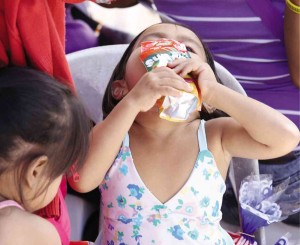
A GIRL sips juice after she and her family fled Tacloban City and arrived in Cebu City. Groups are protesting the distribution of infant milk formula for babies in shelters, saying breast milk is best even during times of disaster. JUNJIE MENDOZA/CEBU DAILY NEWS
DAVAO CITY—Groups advocating breast-feeding are raising a howl over reports that powdered milk products have been included in relief being distributed to survivors of Supertyphoon “Yolanda.”
Dr. Donna Capili, of the group Kalusugan ng Mag-Ina Inc. (KMI), said breast milk should not be substituted by infant milk formula, or powdered milk being produced by multinational firms.
KMI is one of several groups behind “Nanay Bayanihan,” a campaign to provide breast milk for babies that survived Yolanda. Nanay Bayanihan has a tent in Villamor Air Base, where hundreds of survivors of Yolanda from Leyte, Samar and other areas in the Visayas, are being unloaded by C-130 military planes.
Capili said babies, especially those who survived Yolanda, need protection from the ill effects of infant milk formula.
Capili cited the case of a woman who had been used to breast-feeding her baby but unknowingly fed her baby infant milk formula upon arrival at the air base because she lacked awareness about the difference between powdered and breast milk.
“She thought it was what her baby needed,” said Capili. “I told her that even if she was hungry and tired, the milk volume and quality (from her breasts) are still the same,” Capili added.
The powdered milk apparently was donated. Capili said this should not be the case.
The inclusion of powdered milk in relief, said Capili, left the impression that it is a substitute for breast milk.
Groups behind Nanay Bayanihan are applying the strategy Infant Feeding in Emergencies (IFE) recommended by the World Health Organization in crisis situations, such as those brought by the aftermath of Yolanda.
Aside from its potential health risks to babies, the promotion of powdered milk by including this in relief also violates Executive Order No. 51, or the Philippine Milk Code, according to Capili.
Haide Acuna, another breast-feeding campaigner who had visited evacuation centers in Cebu, said the condition of babies who had been brought to the shelters offered a clear image of the ill effects of powdered milk.
“All infants with diarrhea, near death with dehydration and sent to hospitals straight from C-130 (planes) are all bottle- and formula-fed,” Acuna said on her Facebook post.
“All babies who are breast-fed are well and not even sick despite getting soaked cold last Friday (when Yolanda hit),” she added.
Danika Christin Magoncia, who survived Yolanda in Tacloban, said on her Facebook account that she “can never underestimate the power of breast-feeding.”
“With our water and food supply running low, I just breast-fed and breast-fed my son,” Magoncia said. “If our child had been dependent on milk formula, I would have taken part in looting, too,” she quoted her husband as saying.
“When we went out to forage for food, I saw people looting formula milk for their babies,” she added.
Capili said even if the baby were bottle-fed before Yolanda, the baby could be breast-fed anytime.
“If the baby is on formula and less than 6 months of age, the period during which he or she should be exclusively breast-feeding, the main option is for the mother to relactate,” Capili said.
“This process does not take overnight,” she said.
But Capili said if the child is over six months old and is still being bottle-fed, “the focus should be on good complementary feeding.”
“Older babies, especially those over a year of age, should really be eating and not so dependent on milk for nutrition,” she said.
For Acuna, food delivery is not a simple choice between bottled or breast milk. “It is actually a choice between life and death when calamity strikes,” she said. Nico Alconaba, Inquirer Mindanao